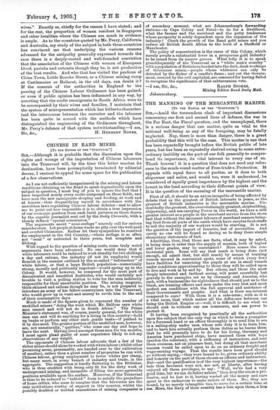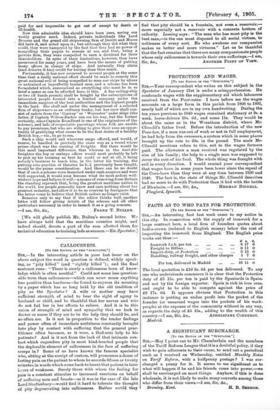TEE EDITOR OF THE "SPECTATOR.")
Sui,—Amid the tremendous clash of important discussions concerning our first and second lines of defence, the war in the Far East, the Fiscal question, and the unemployed, there is a serious danger that one matter, quite as vital to the national well-being as any of the foregoing, may be fatally neglected. Nay, there is more than danger, there is a great probability that this will be the case. This matter is one that has been repeatedly brought before the British public of late years, but has been as repeatedly shelved owing to some extra- ordinary inability on the part of our folk generally to compre- hend its importance, its vital interest to every one of us. Thank heaven ! it is a question that does not need any refer- ence to the much-vexed matter of Free-trade v. Protection. It appeals with equal force to all parties, as it does to both shipowner and sailor, and would too, were it understood, be considered of equally great importance by the highest and the lowest in the land according to their different points of view. It is the question of the maiming of the mercantile marine.
First of all, it should be an axiom incapable of being affected by debate that as the greatest of British interests is peace, so the greatest of British industries is the mercantile marine. Un- doubtedly the greatest, the overwhelmingly greatest, shipbuilding, shipowning, and sea-carrying Power in the world, we have a still greater interest as a people in the merchant service from the stern fact that without the incessant labours of merchant seamen bring- ing food from all parts of the earth which have surplus food-stuffs to sell the majority of our workers would be starving. It is not the question of the import of luxuries, but of necessities. And surely no one will be found so daring as to deny these simple elementary statements of fact. Admitting, then, that these are facts, what, it may be asked, is being done in order that the supply of seamen, both of higher and lower grades, may be maintained ? Here comes the con- troversial part. Some will say that much is being done (not enough, all admit that, but still much) by means of training vessels moored in convenient spots, some of which (very few) have facilities for exercising the pupils at sea in small vessels under conditions approximating to those they will be called upon to live and work in by and by. Bnt others, and those the most deeply interested and farthest seeing, will point scornfully but gravely to the examples set us by Germany and America, who each, with a businesslike far-sightedness that should put us to the blush, are training officers and men under the very best and most perfect sea conditions with the full approval and assistance of their Governments and peoples. And what is their sea-interest compared to ours? With them it is a side-issue; with us it is a vital issue, that which makes all the difference between our being the British Empire or—well, it is difficult to see what we should sink to without our sea commerce, and sea power to protect it. It having been recognieed by practically all the authorities upon the subject that the only way in which to train a youngster for a foremast hand or an officer thoroughly is to send him to sea in a sailing-ship under men whose sole duty it is to train him, and to have him actually perform those duties as he learns them that he will presently have to do for his living, Germany and America have purchased ships, have manned them with boys (pardon the solecism), with a stiffening of instructors, and sent them overseas, not on pleasure bent, but doing all that merchant seamen would be called upon to do on an ordinary freight and wage-earning voyage. That the results have been good should go without saying,—they were bound to be, given ordinary ability and honesty on the part of those chosen as officers and instructors. But—and the qualification is of the very highest importance—the lads thus favoured were not, are not, at liberty, after having enjoyed all these privileges, to say : " Well, we've had a very good time, but we can do better ashore," then drop the sea as a pro- fession, and be lost to it, having wasted all the money and care spent in the endeavour to make sailors of them. No ; they are bound, by no merely intangible ties, to serve for a certain time at sea: More, the Navy of their country has a lien upon them, a lien
Now this admirable idea should have been ours, seeing our vastly greater need. Indeed, private individuals like Lord Bra asey and the grand old shipowning firm of Devitt and Moore . did have it, and acted upon it; but although they did what they could, they were hampered by the fact that they had no power of compelling their pupils to remain at sea, and that, being a private firm, they were compelled to earn a dividend for their shareholders. In spite of their limitations, however, they have • persevered for many years, and have been the means of putting many officers in charge of ships. And naturally they claim (and deserve it too) credit for having done thus much. Fortunately, it has now occurred to several people at the same time that a really national effort should be made to remedy this great national evil of being compelled to man our ships by aliens or untrained or imperfectly trained men, and a scheme has been formulated which, summarised as everything else must be in so brief a space as can be afforded here, is this. A fine sailing-ship or two (if funds permit) shall be bought by the subscriptions of interested people formed into a limited company under the • immediate auspices of the best authorities and the highest people in the land. She shall sail under the management of a selected firm of shipowners as an ordinary trader, but her crew shall con- ga of cadets from the ' Conway' or Worcester' cadet ships (the latter, if Captain Wilson-Barker can see his way, but the former certainly, since Captain Broadbent is one of the originators of the scheme), and lads of respectable parentage whose folk are unable to pay premiums, but who are willing to give their sons an oppor- tunity of gratifying what seems to be the first desire of a healthy British boy,—viz., to go to sea.
Such a ship would sail wherever cargo offered, and would, of course, bo handled in precisely the same way as a vessel whose prime object was the earning of freights. But there would be this most important difference, that whereas in the bond-fide freighter the boy or embryo officer would most probably be left to pick up his training as best he could or not at all, it being nobody's business to teach him, in the latter •his training, the putting into practice of theories he hc.d previously been taught, would be the prime consideration. And there can be no doubt that if such a scheme were launched under such auspices and were well supported, it would soon become what its most ardent well- wishers hope and believe it will—a means of removing from Britain the standing reproach that, being the greatest maritime nation in the world, her people generally know and care nothing about her greatest industry, and allow it to be so overrun by foreigners that the latter come to believe that British sailors no longer exist.
Remains only to say that if the editor thinks well, another letter will follow giving details of the scheme and all other particulars necessary in order to launch it as a going concern.
—I am, Sir, &c., FRANK T. BuLLEN.
[We will gladly publish Mr. Bullen's second letter. We have always held that the maritime counties might, and indeed should, devote a part of the sum allotted them for technical education to training lads as seamen.—En. Spectator.]











































 Previous page
Previous page